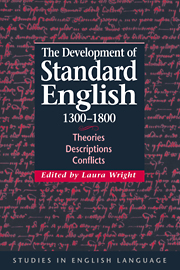Introduction
Published online by Cambridge University Press: 30 September 2009
Summary
Anyone wishing to find out about the rise of Standard English who turned to student textbooks on the history of the English language for enlightenment, would be forgiven for thinking that the topic is now understood. But the story found there is actually rather contradictory. The reader would discover that Standard English is not a development from London English, but is a descendant from some form of Midlands dialect; either East or Central Midlands, depending on which book you read. The selection of the particular Midlands dialect is triggered either by massive migration from the Central Midlands to London in the fourteenth century – or by the migration of a small number of important East Anglians. Why Midlanders coming to London should have caused Londoners to change their dialect is not made clear, nor is it ever spelled out in detail in what ways the Londoners changed their dialect from Southern English to Midland English. Alternatively, you will read that Standard English came from, or was shaped by, the practices of the Chancery – a medieval writing office for the king. Other explanations put forward for why English became standardised at the place and time it did are the prestige of educated speakers from the Oxford, Cambridge and London triangle (although Oxford English, Cambridge English and London English were very different from Standard English then and now); and the naturalness model, whereby Standard English simply came ‘naturally’ into existence (which seems to invoke an implicit assumption about natural selection; for the dangers of this, see Jonathan Hope's contribution to this volume).
- Type
- Chapter
- Information
- The Development of Standard English, 1300–1800Theories, Descriptions, Conflicts, pp. 1 - 8Publisher: Cambridge University PressPrint publication year: 2000
- 30
- Cited by

